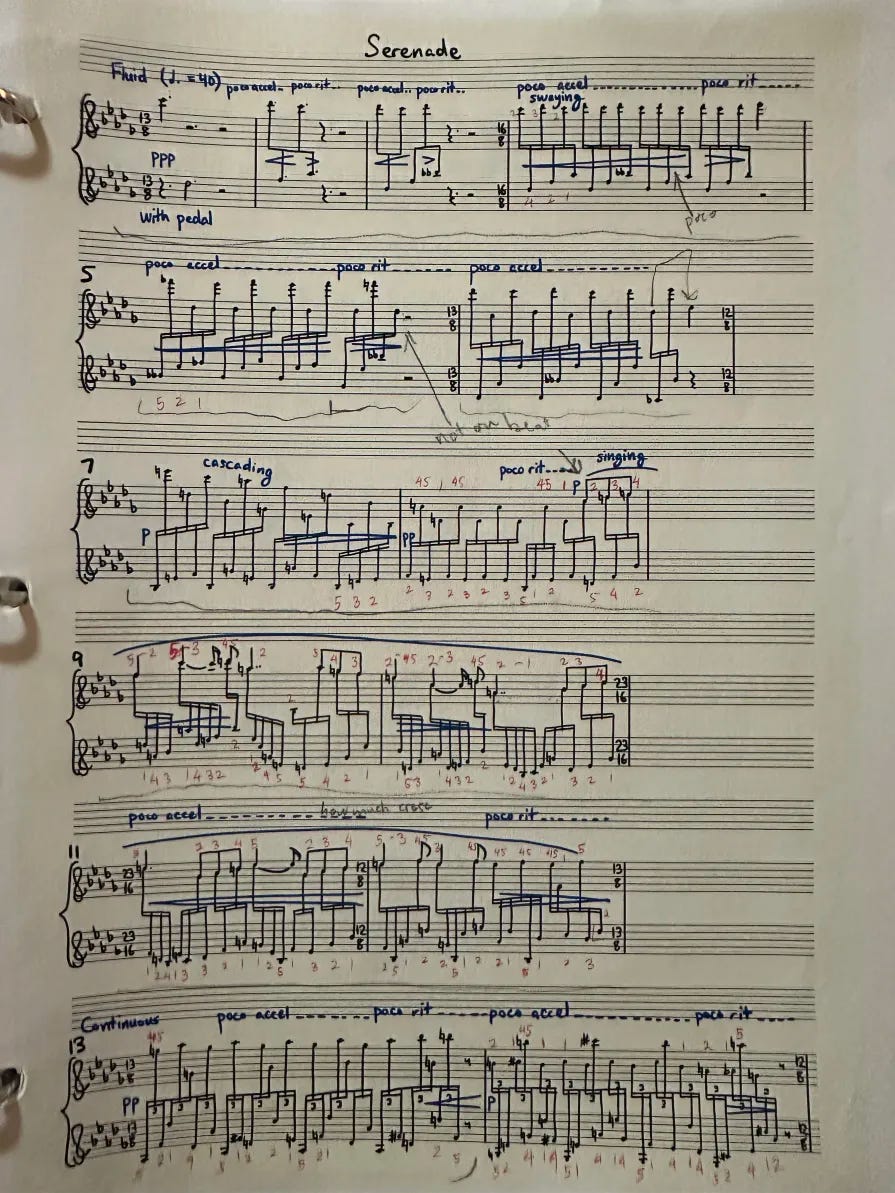Program notes for Holden’s composition Serenade. More to come later, for other works. See details about our composition recital and RSVP here.
This is the companion piece to and comes before Toccata.

What comes before the first I love you?
Heartbeats. First like the flickering of a candle, weak and wavering; then faster, fluid, swaying, driven not by chance but by conviction. The heartbeats cascade over themselves; the lover ruminates, then they sing—
I love you. It is a simple melody, built from a sequence of four ascending notes. A simple melody for a simple phrase with a simple meaning. I love you, the lover sings again, this time with a different inflection; then I love you once, twice, thrice more, and each time with something else in mind; a smile, a kind act, a midnight tryst. You, you, you until the sounds become meaningless.
Are words not so temporary, so ineffectual? How can the lover sing them so that their love knows it not once but continuously—forever? Why even try? Time passes. The heartbeats accelerate. Twos turn into threes; threes turn into fours. Fours are dizzying; how does my love appear so composed, so graceful, when I cannot help but—
I love you spills out, almost involuntarily, and as the lover sings they realize the words have changed. The words are broader and warmer. They reverberate with the weight of shared meals and shared kisses and shared dreams. I love you, a simple melody for a simple phrase. I love you thrice more, and this time each repetition—you, you, you—seems more solid than the next, bringing more details into relief: the way their love brushes their hair from their eyes; the way their love tilts their head and blinks away their fatigue in the morning; the way their love squeezes the lover’s hands when together, they map out their future, which seems so immense, so infinite.
Time passes. As the lover and their love go about their lives, the shops and footpaths they so often frequent take on a certain density. A coffeehouse is first for freshly-brewed coffee; then for conversation; even later for co-working, the lover’s music and their love’s painting or physics or poetry. Time passes. Memories accumulate. The words go unspoken, or are spoken every day and night. Does it matter? Any limp repetition captures little of reality. Flimsy as the words are, the feelings they represent only intensify. Around their love, the lover’s heartbeats become almost tangible, material, like quakes from the footsteps of a giant—
I love you bursts from the lover’s chest. The notes sweep through the once-still air and whip it into a whirlwind. I love you, still the same four notes, but each word somehow more substantial than ever before, deep and full and heavy with harmony. There is so much more you to love than when you were just a heartbeat and a smile. Four times more the lover sings it, I love you, as if trying to grasp the enormity of the sentiment; to the lover’s surprise, on the fifth, the heavens echo fragments back to the pair, as if to reinforce the claim. With relief at the acknowledgment, the lover lets their song fade. The air stills.
Time passes.
I love you, whispers the lover. It has been decades, or perhaps a half-century. I love you—sung so many times, always with a different lilt or thought or cadence—now seems to the lover a strange phrase. After all, the memories are gone. It is just a melody they have always sung and must continue to sing to their love. And despite the lack of intent, their love understands the phrase as a simple, sweet statement of how things are. I love you, I love you, I love you, I love you, I love you.
Time passes. Humans forget. Words evolve. Melodies erode. But—still-familiar, still-fluid—the heart beats as it did before.



this is so cheesy wu